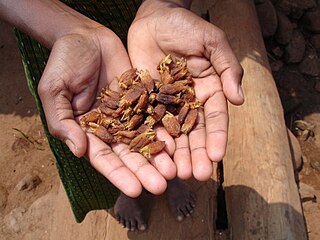Related Research Articles

Cost accounting is defined by the Institute of Management Accountants as "a systematic set of procedures for recording and reporting measurements of the cost of manufacturing goods and performing services in the aggregate and in detail. It includes methods for recognizing, allocating, aggregating and reporting such costs and comparing them with standard costs". Often considered a subset of managerial accounting, its end goal is to advise the management on how to optimize business practices and processes based on cost efficiency and capability. Cost accounting provides the detailed cost information that management needs to control current operations and plan for the future.

The chemical industry comprises the companies and other organizations that develop and produce industrial, specialty and other chemicals. Central to the modern world economy, it converts raw materials into commodity chemicals for industrial and consumer products. It includes industries for petrochemicals such as polymers for plastics and synthetic fibers; inorganic chemicals such as acids and alkalis; agricultural chemicals such as fertilizers, pesticides and herbicides; and other categories such as industrial gases, speciality chemicals and pharmaceuticals.

Inventory or stock refers to the goods and materials that a business holds for the ultimate goal of resale, production or utilisation.

Service economy can refer to one or both of two recent economic developments:
A value chain is a progression of activities that a business or firm performs in order to deliver goods and services of value to an end customer. The concept comes from the field of business management and was first described by Michael Porter in his 1985 best-seller, Competitive Advantage: Creating and Sustaining Superior Performance.
The idea of [Porter's Value Chain] is based on the process view of organizations, the idea of seeing a manufacturing organization as a system, made up of subsystems each with inputs, transformation processes and outputs. Inputs, transformation processes, and outputs involve the acquisition and consumption of resources – money, labour, materials, equipment, buildings, land, administration and management. How value chain activities are carried out determines costs and affects profits.
Capital accumulation is the dynamic that motivates the pursuit of profit, involving the investment of money or any financial asset with the goal of increasing the initial monetary value of said asset as a financial return whether in the form of profit, rent, interest, royalties or capital gains. The aim of capital accumulation is to create new fixed and working capitals, broaden and modernize the existing ones, grow the material basis of social-cultural activities, as well as constituting the necessary resource for reserve and insurance. The process of capital accumulation forms the basis of capitalism, and is one of the defining characteristics of a capitalist economic system.
The Agricultural Marketing Service (AMS) is an agency of the United States Department of Agriculture; it maintains programs in five commodity areas: cotton and tobacco; dairy; fruit and vegetable; livestock and seed; and poultry. These programs provide testing, standardization, grading and market news services for those commodities, and oversee marketing agreements and orders, administer research and promotion programs, and purchase commodities for federal food programs. The AMS enforces certain federal laws such as the Perishable Agricultural Commodities Act and the Federal Seed Act. The AMS budget is $1.2 billion. It is headquartered in the Jamie L. Whitten Building in Washington, D.C.
The Commodity Credit Corporation (CCC) is a wholly owned United States government corporation that was created in 1933 to "stabilize, support, and protect farm income and prices". The CCC is authorized to buy, sell, lend, make payments, and engage in other activities for the purpose of increasing production, stabilizing prices, assuring adequate supplies, and facilitating the efficient marketing of agricultural commodities.
In economics, gross output (GO) is the measure of total economic activity in the production of new goods and services in an accounting period. It is a much broader measure of the economy than gross domestic product (GDP), which is limited mainly to final output. As of first-quarter 2019, the Bureau of Economic Analysis estimated gross output in the United States to be $37.2 trillion, compared to $21.1 trillion for GDP.

Non-timber forest products (NTFPs) are useful foods, substances, materials and/or commodities obtained from forests other than timber. Harvest ranges from wild collection to farming. They typically include game animals, fur-bearers, nuts, seeds, berries, mushrooms, oils, sap, foliage, pollarding, medicinal plants, peat, mast, fuelwood, fish, insects, spices, and forage. Overlapping concepts include non-wood forest products (NWFPs), wild forest products, minor forest produce, special, minor, alternative and secondary forest products – for further distinctions see the definition section below
In classical political economy and especially Karl Marx's critique of political economy, a commodity is any good or service produced by human labour and offered as a product for general sale on the market. Some other priced goods are also treated as commodities, e.g. human labor-power, works of art and natural resources, even though they may not be produced specifically for the market, or be non-reproducible goods. This problem was extensively debated by Adam Smith, David Ricardo, and Karl Rodbertus-Jagetzow, among others. Value and price are not equivalent terms in economics, and theorising the specific relationship of value to market price has been a challenge for both liberal and Marxist economists.

Mitsui & Co., Ltd. is one of the largest sogo shosha in Japan; it is part of the Mitsui Group.
Production is the process of combining various inputs, both material and immaterial in order to create output. Ideally this output will be a good or service which has value and contributes to the utility of individuals. The area of economics that focuses on production is called production theory, and it is closely related to the consumption(or consumer) theory of economics.
Yucheng County is a county located in the east of Henan province, People's Republic of China, affiliated to Shangqiu City, it is 47.5 kilometers wide from east to west, 67.6 kilometers long from north to south, with an area of 1485 square kilometers. It is adjacent to Liangyuan Park, Shangqiu New District and Yuyang District, bordering the provinces of Shandong to the north and Anhui to the south. It is under the administration of the prefecture-level city of Shangqiu, with a population of approximately 1.08 million and an area of 601.547 square miles (1,558.0 km2). According to preliminary statistics, in 2017, the gross domestic product (GDP) of Lucheng County was 25.72 billion yuan, the total retail sales of social consumer goods was 8.26 billion yuan, the investment in fixed assets was 23.77 billion yuan, the per capita disposable income of urban residents was 25,718 yuan, and the per capita disposable income of rural residents was 10,338. yuan
The economy of Guam depends mainly on US military spending and on tourist revenue. Over the past 20 years, the tourist industry grew rapidly, creating a construction boom for new hotels, golf courses and other tourist amenities. More than 1.1 million tourists visit Guam each year including about 1,000,000 from Japan and 150,000 from Korea. Setbacks in the 1990s include numerous super-typhoons, a M7.8 earthquake, and a Korean airline crash.
Specialty chemicals are particular chemical products which provide a wide variety of effects on which many other industry sectors rely. Some of the categories of speciality chemicals are adhesives, agrichemicals, cleaning materials, colors, cosmetic additives, construction chemicals, elastomers, flavors, food additives, fragrances, industrial gases, lubricants, paints, polymers, surfactants, and textile auxiliaries. Other industrial sectors such as automotive, aerospace, food, cosmetics, agriculture, manufacturing, and textiles are highly dependent on such products.
Relations of production is a concept frequently used by Karl Marx and Friedrich Engels in their theory of historical materialism and in Das Kapital. It is first explicitly used in Marx's published book The Poverty of Philosophy, although Marx and Engels had already defined the term in The German Ideology which was only published posthumously in 1932.
In Karl Marx's critique of political economy and subsequent Marxian analyses, the capitalist mode of production refers to the systems of organizing production and distribution within capitalist societies. Private money-making in various forms preceded the development of the capitalist mode of production as such. The capitalist mode of production proper, based on wage-labour and private ownership of the means of production and on industrial technology, began to grow rapidly in Western Europe from the Industrial Revolution, later extending to most of the world.
In Marxian economics, surplus value is the difference between the amount raised through a sale of a product and the amount it cost to manufacture it: i.e. the amount raised through sale of the product minus the cost of the materials, plant and labour power. The concept originated in Ricardian socialism, with the term "surplus value" itself being coined by William Thompson in 1824; however, it was not consistently distinguished from the related concepts of surplus labor and surplus product. The concept was subsequently developed and popularized by Karl Marx. Marx's formulation is the standard sense and the primary basis for further developments, though how much of Marx's concept is original and distinct from the Ricardian concept is disputed. Marx's term is the German word "Mehrwert", which simply means value added, and is cognate to English "more worth".
Duferco Participations Holding SA, is a company based in Luxembourg City, Luxembourg. Its main business is trading, producing, importing and exporting steel.
References
![]() This article incorporates public domain material from Jasper Womach. Report for Congress: Agriculture: A Glossary of Terms, Programs, and Laws, 2005 Edition (PDF). Congressional Research Service.
This article incorporates public domain material from Jasper Womach. Report for Congress: Agriculture: A Glossary of Terms, Programs, and Laws, 2005 Edition (PDF). Congressional Research Service.